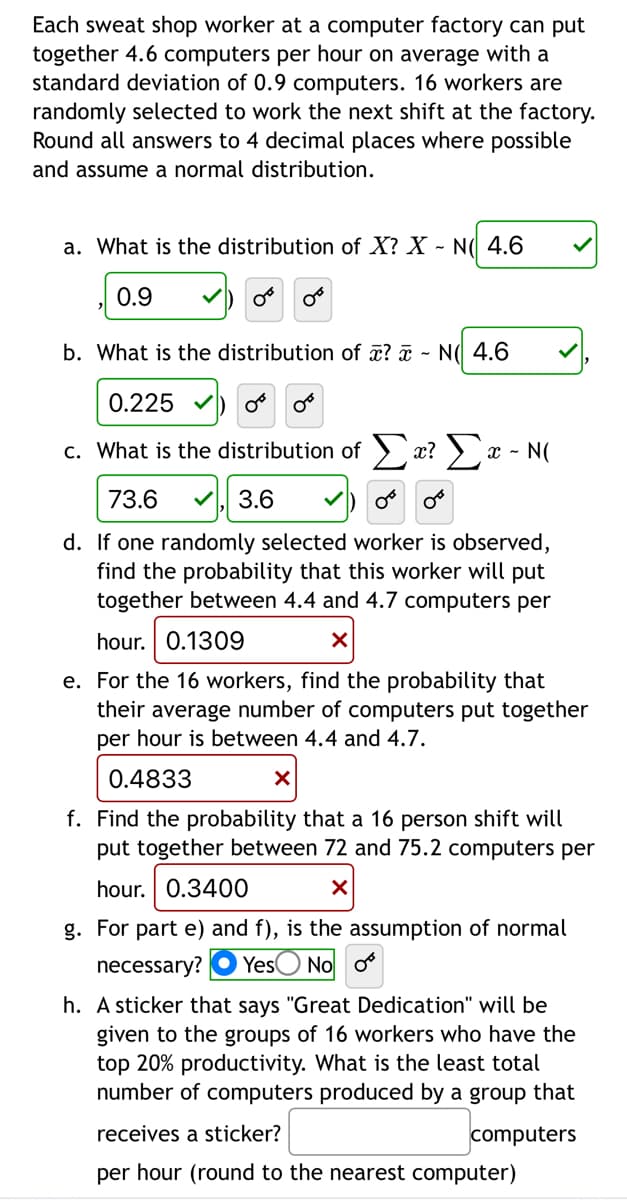Each sweat shop worker at a computer factory can put together 4.6 computers per hour on average with a standard deviation of 0.9 computers. 16 workers are randomly selected to work the next shift at the factory. Round all answers to 4 decimal places where possible and assume a normal distribution. a. What is the distribution of X? X - N 4.6 0.9 08 b. What is the distribution of ? - N 4.6 0.225 ✓ or or c. What is the distribution of Σx? Σx - N( 73.6 3.6 d. If one randomly selected worker is observed, find the probability that this worker will put together between 4.4 and 4.7 computers per hour. 0.1309 X e. For the 16 workers, find the probability that their average number of computers put together per hour is between 4.4 and 4.7. 0.4833 X f. Find the probability that a 16 person shift will put together between 72 and 75.2 computers per hour. 0.3400 X g. For part e) and f), is the assumption of normal
Each sweat shop worker at a computer factory can put together 4.6 computers per hour on average with a standard deviation of 0.9 computers. 16 workers are randomly selected to work the next shift at the factory. Round all answers to 4 decimal places where possible and assume a normal distribution. a. What is the distribution of X? X - N 4.6 0.9 08 b. What is the distribution of ? - N 4.6 0.225 ✓ or or c. What is the distribution of Σx? Σx - N( 73.6 3.6 d. If one randomly selected worker is observed, find the probability that this worker will put together between 4.4 and 4.7 computers per hour. 0.1309 X e. For the 16 workers, find the probability that their average number of computers put together per hour is between 4.4 and 4.7. 0.4833 X f. Find the probability that a 16 person shift will put together between 72 and 75.2 computers per hour. 0.3400 X g. For part e) and f), is the assumption of normal
MATLAB: An Introduction with Applications
6th Edition
ISBN:9781119256830
Author:Amos Gilat
Publisher:Amos Gilat
Chapter1: Starting With Matlab
Section: Chapter Questions
Problem 1P
Related questions
Question
Help with red and blank ones please

Transcribed Image Text:Each sweat shop worker at a computer factory can put
together 4.6 computers per hour on average with a
standard deviation of 0.9 computers. 16 workers are
randomly selected to work the next shift at the factory.
Round all answers to 4 decimal places where possible
and assume a normal distribution.
a. What is the distribution of X? X - I 4.6
0.9
0°
b. What is the distribution of x? - N 4.6
0.225 ✓
OB 0³
c. What is the distribution of Σx? Σx - N(
73.6 ✓ 3.6
d. If one randomly selected worker is observed,
find the probability that this worker will put
together between 4.4 and 4.7 computers per
hour. 0.1309
X
e. For the 16 workers, find the probability that
their average number of computers put together
per hour is between 4.4 and 4.7.
0.4833
X
f. Find the probability that a 16 person shift will
put together between 72 and 75.2 computers per
hour. 0.3400
X
g. For part e) and f), is the assumption of normal
necessary? Yes No o
h. A sticker that says "Great Dedication" will be
given to the groups of 16 workers who have the
top 20% productivity. What is the least total
number of computers produced by a group that
receives a sticker?
computers
per hour (round to the nearest computer)
Expert Solution
This question has been solved!
Explore an expertly crafted, step-by-step solution for a thorough understanding of key concepts.
This is a popular solution!
Trending now
This is a popular solution!
Step by step
Solved in 4 steps

Recommended textbooks for you

MATLAB: An Introduction with Applications
Statistics
ISBN:
9781119256830
Author:
Amos Gilat
Publisher:
John Wiley & Sons Inc

Probability and Statistics for Engineering and th…
Statistics
ISBN:
9781305251809
Author:
Jay L. Devore
Publisher:
Cengage Learning

Statistics for The Behavioral Sciences (MindTap C…
Statistics
ISBN:
9781305504912
Author:
Frederick J Gravetter, Larry B. Wallnau
Publisher:
Cengage Learning

MATLAB: An Introduction with Applications
Statistics
ISBN:
9781119256830
Author:
Amos Gilat
Publisher:
John Wiley & Sons Inc

Probability and Statistics for Engineering and th…
Statistics
ISBN:
9781305251809
Author:
Jay L. Devore
Publisher:
Cengage Learning

Statistics for The Behavioral Sciences (MindTap C…
Statistics
ISBN:
9781305504912
Author:
Frederick J Gravetter, Larry B. Wallnau
Publisher:
Cengage Learning

Elementary Statistics: Picturing the World (7th E…
Statistics
ISBN:
9780134683416
Author:
Ron Larson, Betsy Farber
Publisher:
PEARSON

The Basic Practice of Statistics
Statistics
ISBN:
9781319042578
Author:
David S. Moore, William I. Notz, Michael A. Fligner
Publisher:
W. H. Freeman

Introduction to the Practice of Statistics
Statistics
ISBN:
9781319013387
Author:
David S. Moore, George P. McCabe, Bruce A. Craig
Publisher:
W. H. Freeman